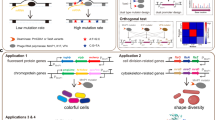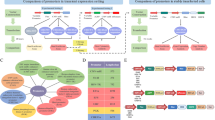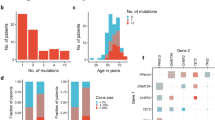Abstract
Chinese hamster ovary cultured cells were transformed to continuously express wild-type and two mutant ornithine transcarbamylase genes, R141Q and R40H. In addition, these cells were transfected to transiently express the same genes. The R141Q mutation abolishes the enzymatic activity, and the amount of “mature” protein present in transfected cells is equivalent to the wild type. The R40H mutation causes a reduction of enzymatic activity to approximately 26 to 35% of wild type concomitant with a significant reduction in the amount of protein present. Transfection with wild-type and mutant genes together in various proportions did not reveal dominant negative effects of the two mutations studied. This expression system can be used to examine the deleterious effect of private mutations or lack thereof in families with ornithine transcarbamylase deficiency as well as evaluate the potential dominant negative effects of gene delivery for treatment of ornithine transcarbamylase deficiency.
Similar content being viewed by others
Log in or create a free account to read this content
Gain free access to this article, as well as selected content from this journal and more on nature.com
or
Abbreviations
- OTC:
-
ornithine transcarbamylase
- OTCD:
-
ornithine transcarbamylase deficiency
- CHO:
-
Chinese hamster ovary
References
Horwich AL, Kalousek F, Fenton WA, Pollock RA, Rosenberg LE 1986 Targeting of pre-ornithine transcarbamylase to mitochondria: definition of critical regions and residues in the leader peptide. Cell 44: 451–459.
Tuchman M, Morizono H, Rajagopal BS, Plante RJ, Allewell NM 1998 The biochemical and molecular spectrum of ornithine transcarbamylase deficiency. J Inher Metab Dis 21: 40–58.
Horwich AL, Fenton WA, Williams KR, Kalousek F, Kraus JP, Doolittle RF, Konigsberg W, Rosenberg LE 1984 Structure and expression of a complementary DNA for the nuclear coded precursor of human mitochondrial ornithine transcarbamylase. Science 224: 1068–1074.
Lee JT, Nussbaum RL 1989 An arginine to glutamine mutation in residue 109 of human ornithine transcarbamylase completely abolishes enzymatic activity in Cos1 cells. J Clin Invest 84: 1762–1766.
Shi D, Morizono H, Ha Y, Aoyagi M, Tuchman M, Allewell NM 1998 1. J Biol Chem 273: 34247–34254.
Matsuda I, Matsuura T, Nishiyori A, Komaki S, Hoshide R, Matsumoto T, Funakoshi M, Kiwaki K, Endo F, Hata A, Shimadzu M, Yoshino M 1996 Phenotypic variability in male patients carrying the mutant ornithine transcarbamylase (OTC) allele, Arg40His, ranging from a child with an unfavourable prognosis to an asymptomatic older adult. J Med Genet 33: 645–648.
Nishiyori A, Yoshino M, Kato H, Matsuura T, Hoshide R, Matsuda I, Kuno T, Miyazaki S, Hirose S, Kuromaru R, Mori M 1997 The R40H mutation in a late onset type of human ornithine transcarbamylase deficiency in male patients. Hum Genet 99: 171–176.
Morizono H, Listrom CD, Rajagopal BS, Aoyagi M, McCann MT, Allewell NM, Tuchman M 1997 Late onset ornithine transcarbamylase deficiency: function of three purified recombinant mutant enzymes. Hum Mol Genet 6: 963–968.
Zhang W, Holzknecht RA, Tuchman M 1990 Immunochemical analysis of carbamyl phosphate synthetase I and ornithine transcarbamylase deficient livers: elevated N-acetylglutamate level in CRM negative carbamyl phosphate synthetase I deficiency. Clin Invest Med 13: 183–188.
Morsy MA, Zhao JZ, Ngo TT, Warman AW, O'Brien WE, Graham FL, Caskey CT 1996 Patient selection may affect gene therapy success. J Clin Invest 97: 826–832.
Seraphin B, Kandels-Lewis S 1996 An efficient PCR mutagenesis strategy without gel purification step that is amenable to automation. Nucleic Acids Res 24: 3276–3277.
Ye X, Robinson MB, Batshaw ML, Furth EE, Smith I, Wilson JM 1996 Prolonged metabolic correction in adult ornithine transcarbamylase-deficient mice with adenoviral vectors. J Biol Chem 271: 3639–3646.
Allewell NM, Shi D, Morizono H, Tuchman M 1999 Molecular recognition by ornithine and aspartate transcarbamylases. Acc Chem Res 32: 885–894.
Raper SE, Wilson JM, Judkoff M, Robinson MB, Ye X, Batshaw ML 1998 Developing adenoviral-mediated in vivo gene therapy for ornithine transcrabamylase deficiency. J Inher Metab Dis 21: 119
Author information
Authors and Affiliations
Additional information
This work was supported by public health service grant DK47870 from the National Institute of Diabetes Digestive and Kidney Diseases.
Rights and permissions
About this article
Cite this article
Augustin, L., Mavinakere, M., Morizono, H. et al. Expression of Wild-Type and Mutant Human Ornithine Transcarbamylase Genes in Chinese Hamster Ovary Cells and Lack of Dominant Negative Effect of R141Q and R40H Mutants. Pediatr Res 48, 842–846 (2000). https://doi.org/10.1203/00006450-200012000-00023
Received:
Accepted:
Issue date:
DOI: https://doi.org/10.1203/00006450-200012000-00023
This article is cited by
-
A dual AAV system enables the Cas9-mediated correction of a metabolic liver disease in newborn mice
Nature Biotechnology (2016)



